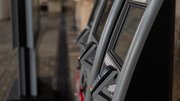Commentary
McDonald’s touchscreen study calls for zero tolerance approach
The McDonald's touchscreens sampled in the U.K. study have caused no illnesses to date, indicating that the risk is being managed. But that’s not the end of the story. The kiosk industry needs to embrace strict sanitation practices in order to maintain its commitment to public safety.

December 10, 2018 by Elliot Maras — Editor, Kiosk Marketplace & Vending Times
There is no such thing as too much public safety concern. The recent news about potentially harmful bacteria found on McDonald's touchscreens in the U.K. alarmed people in the kiosk industry, as such a report would naturally alarm anyone in a responsible industry.
Fortunately, the potential risk the touchscreens posed to diners is manageable. According to health experts, the risk can be managed by following proper sanitation practices. The touchscreens sampled in the study have caused no illnesses to date, indicating that the risk is being managed. But that's not the end of the story.
The kiosk industry needs to embrace strict sanitation practices in order to maintain its commitment to public safety, especially as kiosks — and particularly restaurant kiosks — are expanding at a remarkable rate. The number of self-order kiosks introduced at this year's National Restaurant Show tripled that of last year's show.
Some observers thought the U.K. study, conducted and reported by the Metro newspaper, was alarmist in nature since no health problems have been reported, and the same risk has long existed for many physical objects humans regularly touch, such as doorknobs, cell phones and PC keypads.
One veteran food safety attorney I spoke with called the U.K. study a "nonstory." A Washington Post article, headlined, "No, McDonald's touch screens are not contaminated with poop," called the Metro report alarmist.
The risks are real
I disagree. The U.K. study identified a potential health risk, and risks need to be identified so that preventative action can be taken. The risks are real, and companies operating consumer-facing kiosks cannot ignore them.
Potentially harmful bacteria were found on the U.K. touchscreens despite the fact that the screens are cleaned frequently throughout the day, according to a McDonald's spokesperson. The microbiologist involved in the study, Dr. Paul Matawele, a senior lecturer in microbiology at London Metropolitan University, said people should not eat right after touching the screens.
The Washington Post article that called the Metro report alarmist also quoted a microbiologist, David Coil at the University of California at Davis, as saying that unless we can know who touched the touchscreens, we don't know whether they're dangerous, or how dangerous they could be.
When it comes to public safety, nothing short of a zero tolerance approach will work.
What needs to be done
The National Restaurant Association needs to update its ServSafe program to instruct members how to reduce the risk of exposing diners to potential risks from touchscreens. The association's booklet does not specifically identify touchscreens in its preventative maintenance guidelines. The guidelines note the need to regularly clean "nonfood contact surfaces," such as floors, walls, ceilings and equipment exteriors. While these surfaces need to be cleaned regularly, they do not need to be sanitized, according to the guidelines the NRA emailed to me. The guidelines as written don't adequately address the risk associated with touchscreens.
Meanwhile, kiosk providers shouldn't wait for the association to update its guidelines. They need to advise customers what types of products should be used to sanitize touchscreens.
One company, Generation Next, which markets frozen yogurt and ice cream dispensing kiosks, has already advised its franchisees about cleaning frequency and has its kiosks approved by NSF International, an independent tester and auditor. Generation Next instructs its servicer, CSA Solutions, to apply Hydra Rinse sanitized wipes containing citric acid to the touchscreen, along with the rest of the exterior, with every service visit.
Chris Northrup, vice president of digital media at USSI Global, which provides cleaning services in addition to technology support services, thinks that companies managing customer-facing kiosks could be doing a better job in the area of preventative maintenance. According to Northrup, many companies are not doing preventative maintenance on a regular basis.
There are certainly more important food safety issues for the government to be focusing on today — such as E. coli — than kiosk touchscreen sanitation.
Nevertheless, the industry needs to embrace a zero tolerance policy for preventing exposure to harmful bacteria.
About Elliot Maras
Elliot Maras is the editor of Kiosk Marketplace and Vending Times. He brings three decades covering unattended retail and commercial foodservice.
 ChatGPT
ChatGPT Grok
Grok Perplexity
Perplexity Claude
Claude









